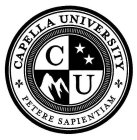DeVry University is a privately owned for-profit university with its headquarters in Naperville, Illinois. It was founded in 1931 by Herman A. DeVry and is accredited by the Higher Learning Commission. DeVry is predominantly an online educator but does have campuses in the United States.

University of Phoenix (UoPX) is a private for-profit university headquartered in Phoenix, Arizona. Founded in 1976, the university confers certificates and degrees at the certificate, associate, bachelor's, master's, and doctoral degree levels. It is institutionally accredited by the Higher Learning Commission and has an open enrollment admissions policy for many undergraduate programs. The school is owned by Apollo Global Management and Vistria Group.
The University of Arizona Global Campus is a public online university affiliated with the University of Arizona. The university announced a deal to acquire Ashford University in 2020 and completed the deal in 2023.

Capella University is a private for-profit, online university headquartered in Minneapolis, Minnesota. The school is owned by the publicly traded Strategic Education, Inc. and delivers most of its education online.

Marylhurst University was a private applied liberal arts and business university in Marylhurst, Oregon. Marylhurst was founded as St. Mary's College in 1893 and run for many years by the Sisters of the Holy Names of Jesus and Mary. The former campus is located about nine miles south of Portland, Oregon on the Willamette River. Although Marylhurst University was a Roman Catholic school, it served students of all faiths and backgrounds.

National American University (NAU) is a private for-profit online university. It is owned by National American University Holdings, Inc. (NAUH). In 2018, NAU acquired the assets of Henley-Putnam University and now offers strategic security programs. Most of NAU's academic programs are on the 11-week quarter system and have monthly starts. The school is accredited by the Higher Learning Commission.

American InterContinental University (AIU) is a private for-profit university with its headquarters in Schaumburg, Illinois. It employs open admissions. American InterContinental University is a member of the American InterContinental University System. It is accredited by the Higher Learning Commission to award associate, bachelor's, and master's degrees. It is owned by the for-profit company Perdoceo Education Corporation, publicly traded on the NASDAQ under PRDO and formerly known as Career Education Corporation (CEC).

Chancellor University was a private for-profit university in Cleveland, Ohio. The school was founded in 1848 as Folsom's Mercantile College to teach basic bookkeeping and business skills. It underwent several changes of name and ownership during its history. The college closed on August 25, 2013, at the conclusion of the summer semester.
In the United States, higher education is an optional stage of formal learning following secondary education. It is also referred to as post-secondary education, third-stage, third-level, or tertiary education. It covers stages 5 to 8 on the International ISCED 2011 scale. It is delivered at 3,931 Title IV degree-granting institutions, known as colleges or universities. These may be public or private universities, research universities, liberal arts colleges, community colleges, or for-profit colleges. US higher education is loosely regulated by the government and by several third-party organizations.

Franklin University is a private university with its main campus in Columbus, Ohio. It was founded in 1902 to serve the needs of students beyond traditional undergraduate age. On-site courses are offered at the university's campus in Columbus' Discovery District. However, most students take courses online. The university has over 25 location centers in the Midwestern United States and a majority online population, and reports an average student age of 34 years.
Corinthian Colleges, Inc. (CCi) was a for-profit post-secondary education company in North America. Its subsidiaries offered career-oriented diploma and degree programs in health care, business, criminal justice, transportation technology and maintenance, construction trades, and information technology. A remnant of the schools was owned by ECMC under the Altierus Career College brand until the last three campuses were closed in 2022.

Colorado Technical University (CTU) is a private for-profit university with its main campus in Colorado Springs, Colorado. Founded in 1965, CTU offers undergraduate, graduate, and doctoral degrees, primarily in business, management, and technology. About 92% of Colorado Tech's students are fully online. According to Colorado Tech, the university has conferred more than 118,000 degrees worldwide. Colorado Tech has no public or official affiliation with the State of Colorado and it is owned by the for-profit company Perdoceo Education Corporation, publicly traded on the NASDAQ under PRDO and formerly known as Career Education Corporation (CEC).

The Robert H. Smith School of Business is the business school at the University of Maryland, College Park, a public research university in College Park, Maryland. The school was named after alumnus Robert H. Smith. One of 12 colleges and schools at the university's main campus, the Smith School offers programs at both the graduate and undergraduate levels. It is accredited by the Association to Advance Collegiate Schools of Business (AACSB) to award bachelor's, master's, and doctoral degrees in business.

Kaplan University (KU) was a private online for-profit university owned by Kaplan, Inc., a subsidiary of Graham Holdings Company. It was predominantly a distance learning institution, maintaining 14 ground locations across the United States. The university was named in honor of Stanley H. Kaplan, who founded Kaplan Test Prep. It was regionally accredited by the Higher Learning Commission, one of seven major accrediting bodies in the U.S., but some programs did not have the field-specific accreditation needed for graduates to obtain certification.

Trident University International is a private for-profit online university based in Chandler, Arizona. It is a member of the American InterContinental University System and accredited by the Higher Learning Commission. It is owned by the for-profit company Perdoceo Education Corporation, publicly traded on the NASDAQ under PRDO and formerly known as Career Education Corporation (CEC).
Rasmussen University is a private for-profit university with multiple locations throughout the United States. It offers associate, bachelor's, master's, and doctoral degrees as well as certificates and diplomas in career-focused areas at 23 campuses in Minnesota, Illinois, North Dakota, Florida, Wisconsin, and Kansas with many programs offered online.

Ashland University is a private Christian university in Ashland, Ohio. The university consists of a 135-acre (55 ha) main campus and several off-campus centers throughout central and northern Ohio. Ashland was founded in 1878 as Ashland College. It is affiliated with The Brethren Church.

The Jack Welch Management Institute (JWMI) at Strayer University is a for-profit online educational institution based in the United States, owned by Strategic Education, Inc. It was founded in 2009 by Jack Welch, former CEO of General Electric and his wife, Suzy Welch, author and public speaker. JWMI offers an online executive Master of Business Administration degree, graduate certificates, and executive certificates for working adults. The company is headquartered outside of Washington D.C. at Strayer University's corporate office - 2303 Dulles Station Blvd, Herndon, VA 20171.

National University is a private university with its headquarters in San Diego, California. Founded in 1971, National University offers academic degree programs at campuses throughout California, a satellite campus in Nevada, and various programs online. Programs at National University are designed for adult learners. On-campus classes are typically blended learning courses, concentrated to four weeks or on weeknights with occasional Saturday classes. The university uses asynchronous learning and real-time virtual classrooms for its online programs.
For-profit colleges, also known as proprietary colleges, are post-secondary schools that rely on investors, and survive by making a profit. They include for-profit vocational and technical schools, career colleges, and predominantly online universities. For-profit colleges have frequently offered career-oriented curricula including culinary arts, business and technology, and health care. These institutions have a long history in the US, and grew rapidly from 1972 to 2009. The growth of for-profit education has been fueled by government funding as well as corporate investment, including private equity.















